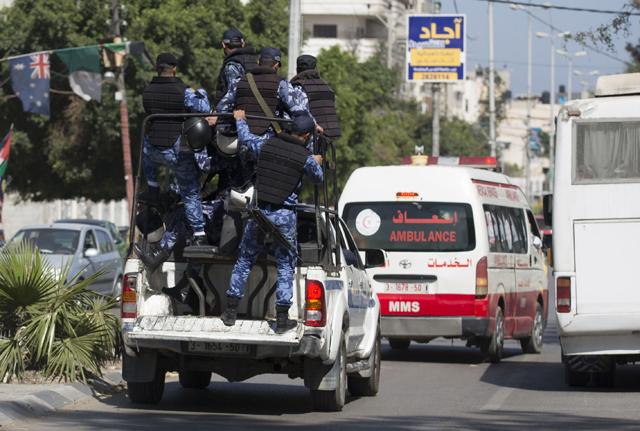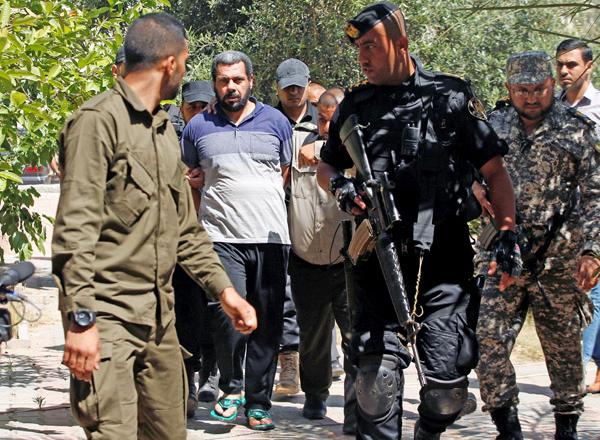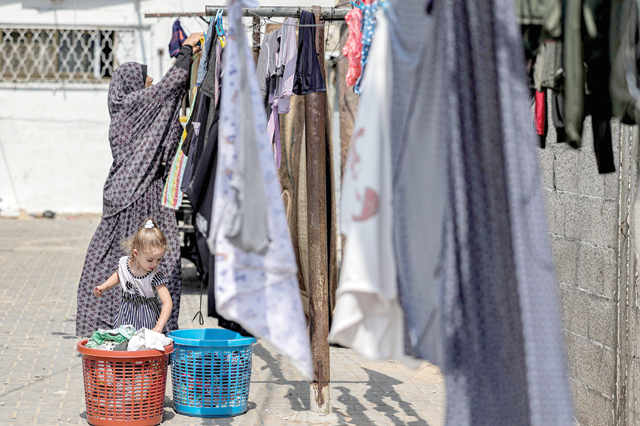You are here
Hamas hangs three Gaza ‘collaborators’ with Israel
By AFP - Apr 07,2017 - Last updated at Apr 07,2017

Hamas police secure the area as an ambulance reportedly carrying the bodies of men accused of collaborating with Israel leaves the main police building in Gaza City on Thursday (AFP photo)
GAZA — Gaza’s Hamas rulers on Thursday hanged three men they convicted of collaborating with Israel, fulfilling vows of revenge for the mysterious killing of one of their commanders last month.
The men, dressed in red prison jumpsuits, were shackled hand and foot and hooded as they were put to death at an exercise ground inside a police facility in Gaza City, an AFP correspondent reported.
Senior Hamas officials and representatives of other Gaza-based groups observed the hangings.
A few journalists also attended, though they were not allowed to take photographs.
The men were aged 55, 42 and 31, the Hamas-run interior ministry said, without naming them.
Human Rights Watch and other rights groups condemned the “barbaric” deaths.
Hamas accuses the Israeli intelligence agency Mossad and its Palestinian “collaborators” of killing senior military leader Mazen Faqha near his home in Gaza on March 24.
Hamas’ police chief Taysir Al Batsh said the three men were not linked to the killing but were accused of past acts of treason and collaborating.
The deaths, he said, “represent a message to the [Israeli] enemy security sources and to the collaborators”.
The men were brought individually to the gallows and hanged at 15-minute intervals.
‘Barbaric practice’
Each convict climbed a steel ladder accompanied by masked police, where a rope was fitted around their necks before the hangings.
The square was blocked from three sides by a black curtain, with the chief military prosecutor reading out a list of charges before each man was put to death.
Hamas has previously carried out death sentences for “collaborators”, including in 2014, when six people were shot dead in public during that year’s Israeli aggression on Gaza.
The interior ministry said those executed on Thursday had received due process.
“The decision was upheld by each military appeals court and the high military court,” said the interior ministry.
Human Rights Watch condemned the executions.
“The death penalty is a barbaric practice,” it said.
“The abhorrent executions by Hamas authorities of three men in Gaza deemed to be collaborators project weakness, not strength.
“Hamas authorities will never achieve true security or stability through firing squads or by the gallows, but rather through respect for international norms and the rule of law.”
Hamdi Shaqura from the Gaza-based Palestinian Centre for Human Rights also condemned the punishment.
He called the death penalty a “punishment that must be abolished, a punishment that doesn’t represent a deterrent to crime.”
An Israeli government spokesman pointed to the recent election of hardliner Yahya Sinwar as Hamas’s Gaza chief as reason for the killings, saying he had “executed many Palestinians before”, referring to a Hamas intelligence unit he set up that flushed out “collaborators”.
Israeli Defence Minister Avigdor Lieberman has implied he may have been killed in an internal Hamas feud, but Israel remains a plausible suspect.
‘Radical measures’
Israel has killed several Hamas leaders in the past and has accused Faqha of being behind several deadly bomb attacks against Israelis during the second Palestinian Intifada, or uprising, of 2000 to 2005.
Hamas says Faqha formed units of the Islamist group’s military wing in the West Bank cities of Tubas, where he was born, and Jenin.
The Islamist group has pledged “radical measures” against Palestinians who “collaborated” with Israel.
Hamas has also offered “collaborators” with Israel a chance to turn themselves in and receive clemency.
“The doors of repentance will be open for one week, from Tuesday, April 4 to Tuesday, April 11,” the interior ministry said this week.
Hamas also tightly restricted movement out of the enclave following the assassination.
The restrictions had stopped male patients aged between 15 and 45 from using the territory’s sole crossing for people to enter Israel to receive medical treatment, said Human Rights Watch.
Security checks and searches also increased, including roadblocks.
On Thursday the interior ministry announced the measures had been eased.
The territory has been under an Israeli blockade for 10 years.
Related Articles
GAZA CITY, Palestinian Territories — A court in the Gaza Strip on Sunday sentenced three men to death over the assassination of a Hamas mili
GAZA CITY, Palestinian Territories — The Hamas Islamist movement ruling the Gaza Strip announced on Sunday that it executed five Palestinian
OCCUPIED JERUSALEM — Defence Minister Avigdor Lieberman said Sunday Israel did not seek "adventures" in Gaza after Hamas accused it of assas














